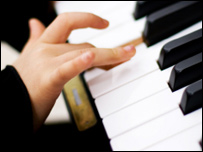 |
| What instrument can you play? |
Can you play amusical instrument? Where did you learn to play it? If you were apupilin a British school, you would most probably learn at school. Approximately 25% of British pupils learn an instrument. What's more, of the 75% that don't, 40% would like to.
But what instruments do the pupils learn to play?Traditionally, school children learntclassicalinstruments, such as thepianoorviolin. This is still true today. Younger children often learn therecorder. As they get older, they start to play the violin or piano. In fact, nearly one out of five music students is learning the violin. The piano, orkeyboard, is more popular with older children at secondary school.
However, things are changing. More pupils than ever before are now learning theguitar. As many as 16% of pupils learning an instrument arestrummingitsstrings. Paul McManus, theChief Executiveof the Music Industries Association told the Telegraph newspaper that new Britishbandslike Franz Ferdinand, the Arctic Monkeys and Razorlight had made playing the guitar 'cool' again. This, perhaps, is why more children are now learning the guitar.
British schools do not just offer lessons for instruments. All pupils learn music together as a class. These classes have been changing, too. In the past, thefocusof classes was very much Western classical music. But the classes now cover a far wider range of styles, includingfolkmusic andworld music. In a recent study by Keele University, 64% of boys and 70% of girls said they enjoy music lessons as a class. They like singing, playing instruments and find the lessons fun.
Many schools haveorchestrasandput on concertseach term. It is also common for pupils themselves to form their own bands, copying their rock and pop heroes.
In conclusion, music plays a big part in British schools. Pupils can study an instrument, play music together as a class and even take part in concerts and plays.